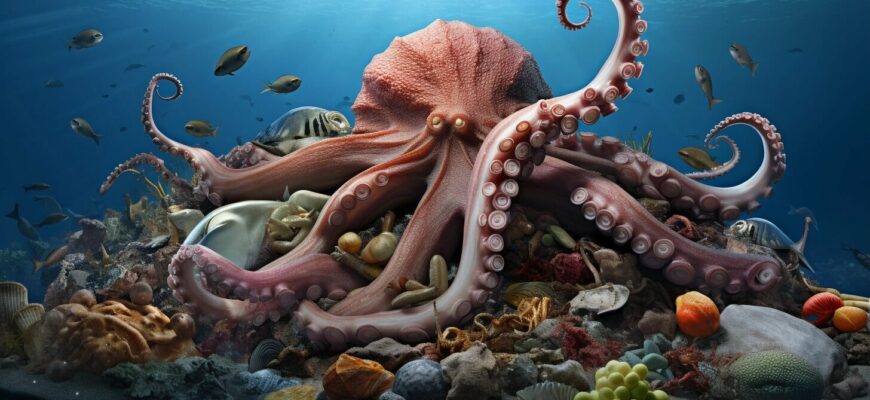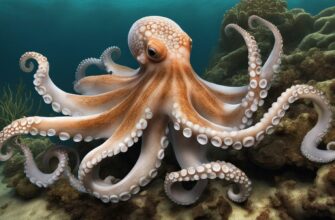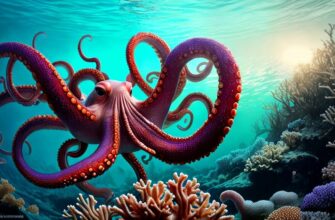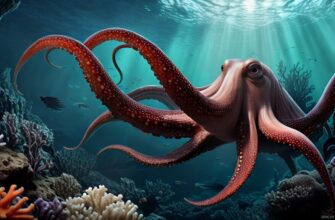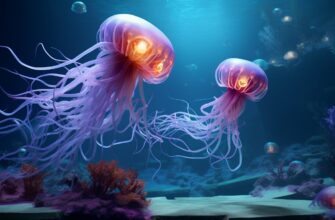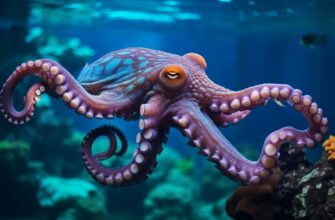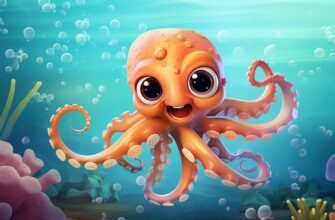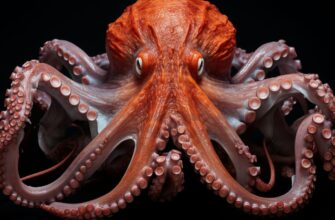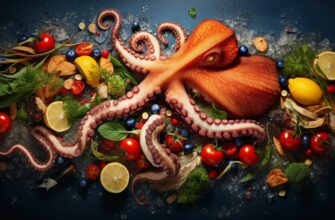When it comes to underwater food chains, the diet of predators can be surprising. Many of us assume that sharks reign supreme as the apex predator, but what about other marine creatures that may be lurking beneath the surface? One such creature is the octopus.
But do octopuses really eat sharks? The answer may surprise you. In this article, we’ll explore the feeding habits and diet of octopuses and sharks, examine the potential for octopuses to overpower sharks, and look at rare instances where these intelligent creatures have been observed consuming their shark counterparts.
- Octopus Feeding Habits and Diet
- Shark Diet and Predators
- Octopus vs. Shark: Can Octopuses Overpower Sharks?
- Rare Instances of Octopuses Eating Sharks
- The Role of Sharks in the Ocean Food Chain
- FAQs about Octopuses Eating Sharks
- Can octopuses really eat sharks?
- How do octopuses hunt their prey?
- What do octopuses usually eat?
- What do sharks typically eat?
- Why are sharks important in the ocean food chain?
- What impact would the absence of sharks have on the ocean food chain?
Octopus Feeding Habits and Diet
Octopuses are known to be opportunistic predators, feeding on a variety of marine organisms, including fish, crustaceans, and mollusks. In fact, they have been observed eating over 160 species of prey!
Octopuses are equipped with eight arms that are lined with suction cups. They use these arms to capture their prey and bring it to their mouth, which is located at the center of their arms. To consume their food, octopuses use a sharp beak to break the prey’s tough outer shell or body.
Most octopuses are active hunters, searching for food in their environment. However, some species, such as the blue-ringed octopus, use their venomous bite to immobilize prey before consuming it.
It’s worth noting that octopuses are not at the top of the food chain. Although they are skilled hunters, they are preyed upon by larger animals such as sharks and seals.
Shark Diet and Predators
Sharks are top predators in the ocean food chain and play a crucial role in maintaining the balance of marine ecosystems. Their diet depends on their species and habitat, but generally, they feed on a variety of marine animals including fish, squid, crustaceans, and marine mammals like seals and dolphins.
Despite being formidable hunters themselves, sharks have natural predators that can pose a threat to their survival. These include larger sharks, killer whales, and humans who hunt them for their meat, fins, and other body parts.
Octopus vs. Shark: Can Octopuses Overpower Sharks?
Octopuses have a reputation for being intelligent and resourceful creatures, but can they overpower sharks?
While sharks are powerful predators, octopuses have a few tricks up their sleeves that can potentially give them the upper hand in an encounter. For example, octopuses are masters of disguise, able to change their skin color and texture to blend in with their surroundings. This makes it challenging for sharks to detect them and launch an attack.
Additionally, octopuses have a unique defense mechanism. When threatened, they release a cloud of ink to create a screen of confusion and cover their escape. The ink also contains a substance that can temporarily disable a predator’s sense of smell, making it harder for sharks to locate the octopus.
While there are no documented cases of octopuses regularly preying on sharks, there have been rare instances where octopuses have been observed consuming small sharks. However, the vast majority of encounters between octopuses and sharks likely result in the octopus retreating to safety.
Overall, while it’s not impossible for octopuses to overpower sharks, it’s unlikely to be a common occurrence. Sharks remain formidable predators in the ocean food chain, and their presence is vital to maintaining healthy marine ecosystems.
Rare Instances of Octopuses Eating Sharks
While it is not a common occurrence, documented cases exist of octopuses preying on sharks. One such example was captured on film in 2008, off the coast of California, where a small octopus was seen overpowering a horn shark, dragging it across the ocean floor, and consuming it. Another instance was recorded in 2016, near the French Mediterranean coast, where a common octopus was observed killing and feeding on a shark.
These rare instances of octopuses consuming sharks usually involve smaller species of sharks, and it is not common for larger sharks to be targeted. However, it does demonstrate that octopuses are capable of preying on sharks.
The Role of Sharks in the Ocean Food Chain
Sharks are key players in the ocean food chain, serving as apex predators, which means they are at the top of the food chain and have no natural predators. As such, sharks play a crucial role in maintaining the balance of marine ecosystems.
Sharks are known for their voracious appetites, and they feed on a variety of prey, including fish, squid, octopuses, and other sharks. By controlling the population of these prey species, sharks help prevent overpopulation, which can lead to the depletion of other resources in the ecosystem.
Sharks also help maintain the balance of the ocean food chain by keeping populations of other predators in check. Without sharks, these predators could overpopulate and threaten the stability of the entire ecosystem.
Additionally, sharks help to maintain the health of the ocean by removing sick, injured, or weaker prey, which helps prevent the spread of disease and parasites.
Unfortunately, due to overfishing, pollution, and other human activities, many shark populations are threatened or endangered. This poses a significant risk to the balance of the ocean food chain, as well as to the health of the overall marine ecosystem.
Efforts are being made to protect and conserve shark populations, including the creation of marine protected areas and the implementation of sustainable fishing practices. By protecting sharks and their habitat, we can help ensure the continued health and vitality of the ocean food chain.
FAQs about Octopuses Eating Sharks
Now that we’ve explored the topic of octopuses eating sharks, here are some common questions you might have:
Can octopuses really eat sharks?
While it’s not a common occurrence, there have been documented cases of octopuses consuming sharks. These instances are rare, however, as sharks typically prey on octopuses.
How do octopuses hunt their prey?
Octopuses are known for their intelligence and adaptability. They use a combination of stealth, camouflage, and their eight tentacles to capture their prey. They can also release ink as a defense mechanism.
What do octopuses usually eat?
Octopuses have a varied diet, which includes crabs, shrimp, fish, and other marine creatures. They are opportunistic hunters and will consume whatever is available in their environment.
What do sharks typically eat?
Sharks are apex predators and consume a variety of marine life, including fish, squid, and smaller sharks. Some species, like the great white shark, are known for their ability to hunt and consume larger prey like seals and sea lions.
Why are sharks important in the ocean food chain?
As apex predators, sharks play a crucial role in maintaining the balance of marine ecosystems. They help regulate the populations of other marine creatures, preventing any one species from becoming too dominant.
What impact would the absence of sharks have on the ocean food chain?
Without sharks, the populations of smaller marine creatures could grow unchecked, leading to imbalances and disruptions in the food chain. This, in turn, could have a cascading effect on other aspects of ocean life.
We hope this article has answered your questions about octopuses eating sharks. Remember, while it may happen occasionally, it’s still a rare occurrence in the underwater world.

